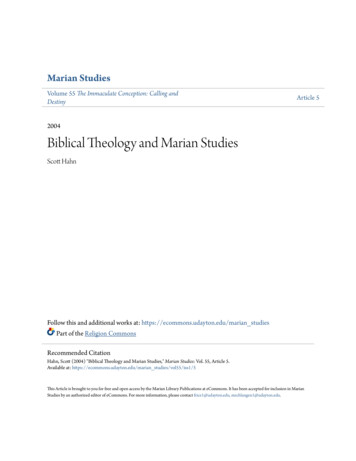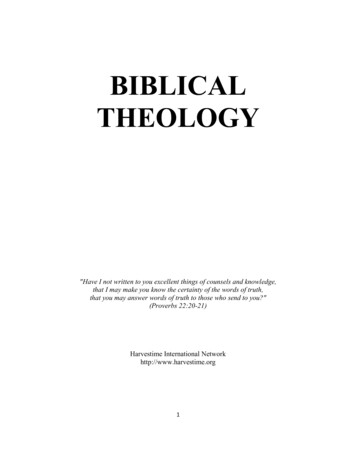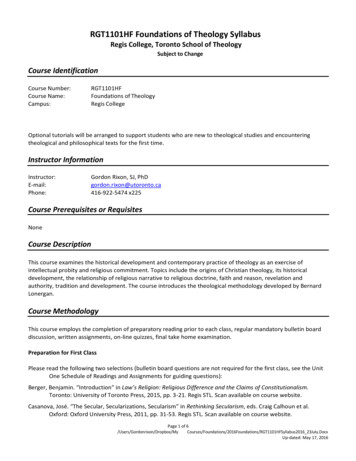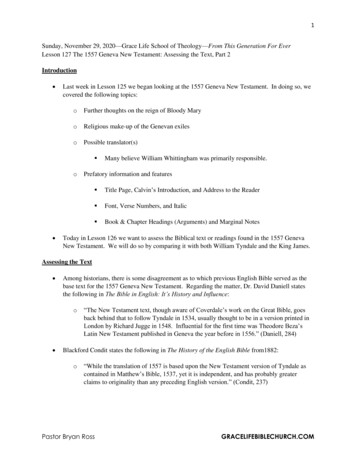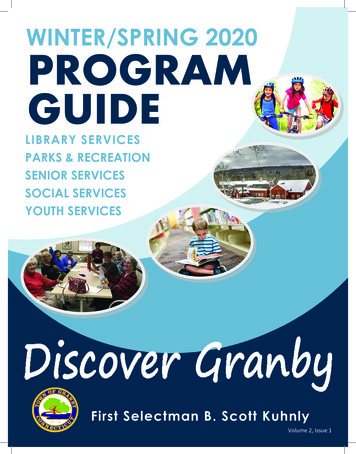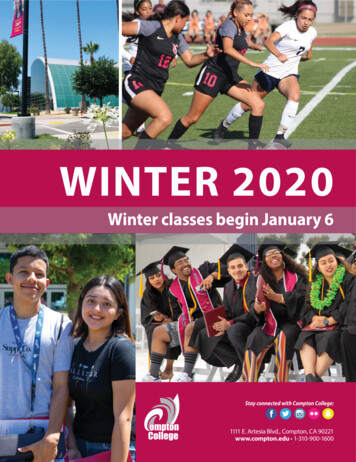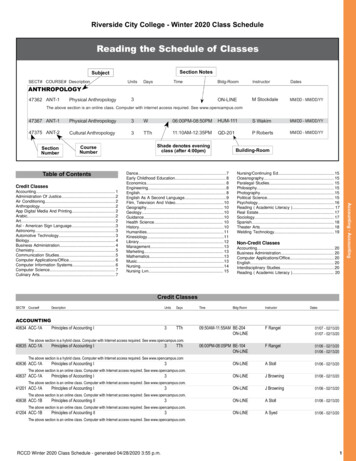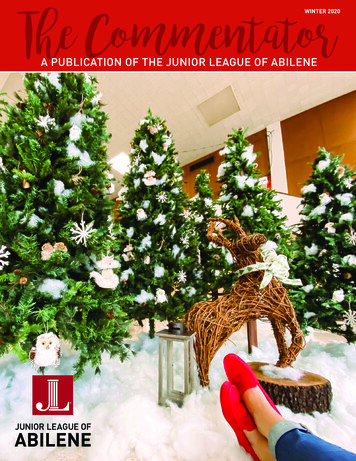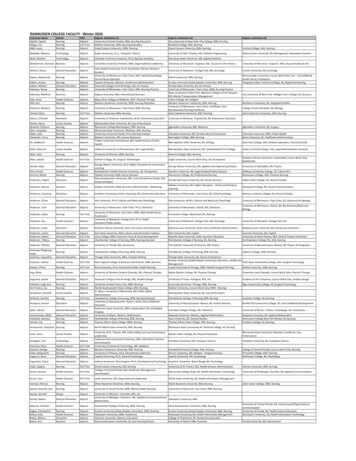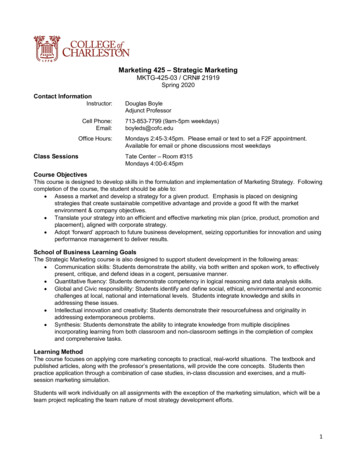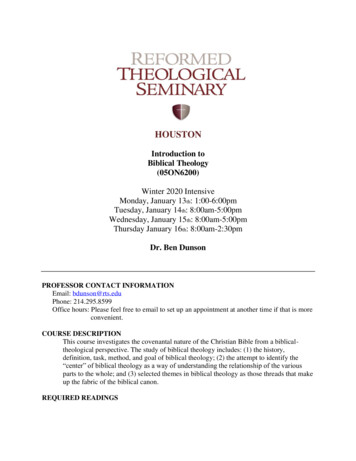
Transcription
HOUSTONIntroduction toBiblical Theology(05ON6200)Winter 2020 IntensiveMonday, January 13th: 1:00-6:00pmTuesday, January 14th: 8:00am-5:00pmWednesday, January 15th: 8:00am-5:00pmThursday January 16th: 8:00am-2:30pmDr. Ben DunsonPROFESSOR CONTACT INFORMATIONEmail: bdunson@rts.eduPhone: 214.295.8599Office hours: Please feel free to email to set up an appointment at another time if that is moreconvenient.COURSE DESCRIPTIONThis course investigates the covenantal nature of the Christian Bible from a biblicaltheological perspective. The study of biblical theology includes: (1) the history,definition, task, method, and goal of biblical theology; (2) the attempt to identify the“center” of biblical theology as a way of understanding the relationship of the variousparts to the whole; and (3) selected themes in biblical theology as those threads that makeup the fabric of the biblical canon.REQUIRED READINGS
Reading Order: read the articles first (before class begins) and in the order listed, andthen read the books (also preferably before class; but it is more important that you readthe articles before class begins, especially the first three)Books:1. T. Desmond Alexander, The City of God and the Goal of Creation. Short Studies inBiblical Theology. Wheaton: Crossway, 2018. ISBN-13: 978-1433555749 (192 pages)2. Jonty Rhodes, Covenants Made Simple: Understanding God’s Unfolding Promises to HisPeople. Phillipsburg: P & R, 2013. ISBN-13: 978-1596389755 (170 pages)Articles and Book Chapters:3. Geerhardus Vos, “The Idea of Biblical Theology as a Science and as a TheologicalDiscipline,” Pages 3-24 in Redemptive History and Biblical Interpretation: The ShorterWritings of Geerhardus Vos. Edited by Richard B. Gaffin, Jr. Phillipsburg: P & R, 1980.Will be posted on Canvas. (22 pages)4. Richard B. Gaffin, Jr., “Systematic Theology and Biblical Theology,” 20/systematic-theology-and-biblical-theology5. Carl R. Trueman, “Some Thoughts on Systematic Theology as Poor Relation,” TheMortification of Spin Blog (4 parts)a. Part 1: or-relation-part-oneb. Part 2: doctrine-some-thoughts-on#.XXaCGJNKhbUc. Part 3: matic-theology-as-poord. Part 4: tematic-theology-as-poor#.XXaCT5NKhbU6. Geerhardus Vos, “The Interaction Between Eschatology and Soteriology,” Pages 42-61 inThe Pauline Eschatology. Phillipsburg: P & R, 1994. Will be posted on Canvas (19pages)7. G.K. Beale, “The New Testament and New Creation,” pp. 159-173 in Biblical Theology:Retrospect and Prospect. Edited by Scott J. Hafemann. Grand Rapids: IVP, 2002. Willbe posted on Canvas (14 pages)COURSE EXPECTATIONS1. Attendance Policy: Attendance is required. This is especially important in an intensiveclass. Please note that arriving more than 5 minutes late or leaving more than 5 minutesearly may be considered “absent.”2. Late Work Policy: All assignments are due as scheduled. Unexcused late work will notbe accepted. Late work will only be considered in cases of unexpected emergency. Insuch cases contact me as soon as possible.3. Technology: Laptops (and iPads, etc.) are not allowed in this course, neither is use ofyour phone (apart from emergency situations). From the RTS Student handbook:“Classroom etiquette also includes leaving cell phones turned off, refraining from surfingthe Internet, playing computer games, texting, and communicating with your neighborduring lectures.”2
4. As a courtesy, please do not tweet, or otherwise post, comments made by the professor orother students without asking permission first.TEXTBOOK READINGSYou must read all of the assigned course textbook readings by the end of the semesterand will be required to tell me what percentage of the textbook readings you completedon the final exam. This reading will be worth 20% of your course grade.BIBLICAL-THEOLOGICAL PAPER1. You will write a paper on a biblical theological theme. This will involve tracing a specifictheme across the whole Bible, although you will have to be selective. Focus on keypassages in the OT and NT that illustrate your theme.2. A focus of the paper will be on how your theme develops over time, especially how itfinds its fulfillment in Christ (see Luke 24).3. Your paper must be at least 11 pages, and must not be longer than 12 pages. You willhave to be concise and stick with the main point in your papers.4. See pages 5-7 of syllabus for more detailed instructions.5. Papers must be emailed to me by 12pm, Tuesday, March 31st, 2020. Late papers willbe penalized ten points every day they are overdue.*Some possible paper topics: tabernacle/temple, creation/new creation, covenant, kingdom,land, people of God, messiah, etc. These topics will be discussed in class. For this assignmentI want to see you reflecting on the biblical text (and using secondary literature) rather thansimply repeating the big, thematic presentations I give in class.This assignment will be worth 40% of your course grade.FINAL EXAMYou will take a final exam that will be worth 40% of your course grade. You areresponsible for all of the textbook readings and lecture material from the course. Theexam may include any of the following: multiple choice, short answer, or essayquestions. I will discuss the exam in more detail later in the class.*To take the final exam you will need to find a proctor and email me his or her emailaddress (after you’ve checked with that person!). The proctor will preferably be a pastoror elder at your church. Sometimes church administrators are able to be proctors. Yourproctor needs to be able to observe you during the taking of the exam (even if they aren’tin the same room).**The exam must be taken by 12pm, Tuesday, March 31st, 2020 (same date as paperdue date).EVALUATIONCompletion of Textbook Readings: 20%Biblical-Theological Paper: 40%Final Exam: 40%3
*Note: The professor reserves the right to alter this syllabus prior to, or during, the class. In thecase that major revision should occur they will be pointed out in class and an electronic copy ofthe syllabus will be emailed to the class.4
Biblical-Theological Thematic Paper GuidelinesBasic Guidelines:1. Papers should be 11-12 pages (double-spaced), Times New Roman Font, with 1 inchmargins.2. You must cite at least 8 scholarly sources (commentaries, books, articles, etc.). Websitesand Wikipedia do not count as sources, although they might point you to valid sources.Only include works in your bibliography that you have actually cited in your paper andfootnotes. Use footnotes when you cite a source in your paper. See formattinginformation at end of this guide.3. The basic idea is simple: pick a biblical theme (land, temple, judgment, creation,kingdom, covenant, Exodus, etc.) and trace it through the Bible. You will not be able tobe exhaustive, but try to touch on the main texts in the Bible that deal with your topic. Donot just list them (and certainly do not fill up space with long quotations of the biblicaltext). Explain the text. Explain how we learn something new about your theme asredemption and revelation move us forward in the biblical story. Especially note howwithin the OT itself your theme starts to take on a future focus (especially in theprophets).4. Christ-centered focus: make sure that you end by relating your theme to how it finds itsfulfillment in Christ (as we discussed over many lectures in class).5. Papers will be graded according to content and style (correct grammar and spelling, lackof typos, etc.). Proofread!A word on using secondary sources: the focus of your paper should not be a meresummary of the views of other scholars and all of the various interpretive options thatyou find in your secondary reading. The focus should be your own reflections. You arecertainly free to employ the arguments of secondary sources (assuming you correctly citethem), but do not allow a discussion of secondary sources to distract you from presentingyour own reflections.Formatting Issues:1. General Formatting. You must format your papers according to Kate L. Turrabian, AManual for Writers of Research Papers, Theses, and Dissertations: Chicago Style forStudents and Researchers (8th ed.; Chicago: University of Chicago Press, 2010). Themost important information for formatting your footnotes and bibliographies is in chs.15-17 (pp. 135-215). You must format your paper according to the Notes-Bibliographystyle. You may not use the Author-Date style (chs. 18-19). I would also highlyrecommend that you familiarize yourself with all of Part III (Style), but especially chs.20, 21, and 25. You will receive a lower grade if your paper is not formatted according toTurrabian chs. 15-17, and if your style is incorrect. You will get a zero for your paper if5
you plagiarize, and will face disciplinary measures from the college (thus: learn how toquote sources according to ch. 25 if you do not already know how).2. Biblical Books. The following info is the same as the shorter form of biblical bookabbreviations found in Turabian, pp. 339-42. The following info is taken from:http://www.sbl-site.org/assets/pdfs/sblhs ss92804 revised ed.pdf. You must cite biblicalbooks in this way, and you must write out biblical books, etc., in the way detailed below.You will be penalized for not doing so.Citations of modern Bible versions do not require publisher’s information in eitherfootnotes or bibliography; instead, use standard abbreviations for the Bible version (e.g.,NRSV, RSV, NIV, NASB). If citing scripture from a single version, include the abbreviationof the version following the chapter and verse on the first scripture reference only. Whenciting more than one version in a paper, include the version after each citation.“Now Ahab had seventy sons in Samaria” (2 Kgs 10:1 NRSV).When citing specific chapters and verses, use the standard abbreviated titles of biblicalbooks:Old Testament:GenExodLevNumDeutJoshJudgRuth1–2 Sam1–2 Kgs1–2 umbersDeuteronomyJoshuaJudgesRuth1–2 Samuel1–2 Kings1–2 ChroniclesEzraNehemiahEstherJobPsalmsProverbsEccl (or Qoh) Ecclesiastes (or Qoheleth)Song Song of Songs (or Song of ephaniahHaggaiZechariahMalachiNew Testament:MattMarkMatthewMark1–2 Thess1–2 Tim1–2 Thessalonians1–2 Timothy6
LukeJohnActsRom1–2 CorGalEphPhilColLukeJohnActsRomans1–2 TitusPhlmHebJas1–2 Pet1–2–3 JohnJudeRevTitusPhilemonHebrewsJames1–2 Peter1–2–3 JohnJudeRevelationIf a biblical book is the first word of the sentence, do not abbreviate the title. Also, whenreferring to the book as a whole or a person with the same name as a biblical book, do notabbreviate.Right:Revelation 3 begins with the letter to the church in Sardis.We know little about the historical Habakkuk.Wrong:Rev 3 begins with the letter to the church in Sardis.We know little about the historical Hab. 2Cite Bible verses with chapter and verse(s) using arabic numerals separated by a colon.Do not write out the numbers.Right:Wrong:John 5:8–9John chapter five verses eight and nine.When citing multiple passages, list the abbreviated title of each new biblical bookfollowed by the chapter number and colon, with all verses in that chapter separated by acomma and space. A semicolon should separate references to subsequent chapters orbooks. Do not include the conjunction “and” or an ampersand before the last citation. Listpassages in canonical and numerical order.Right:Wrong:Matt 2:3; 3:4–6; 4:3, 7; Luke 3:6, 8; 12:2, 5; Acts 15:1–5; Rom1:8–12Luke 3:6, 8; Luke 12:2; Matt 2:3, 3:4–6; 4:3; Luke 3:6, 8 and 12:2Rom 1:8–12; Matt 2:3; 4:3, 7; 3:4–67
Course Objectives Related to MDiv* Student Learning OutcomesCourse:Professor:Campus:Date:Introduction to Biblical Theology (05ON6200)Ben DunsonHoustonWinter 2020MDiv* Student Learning OutcomesIn order to measure the success of the MDiv curriculum, RTS has definedthe following as the intended outcomes of the student learning process.Each course contributes to these overall outcomes. This rubric shows thecontribution of this course to the MDiv outcomes.Articulation(oral &written)ScriptureBroadly understands and articulatesknowledge, both oral and written, of essentialbiblical, theological, historical, andcultural/global information, including details,concepts, and frameworks. Also includesability to preach and teach the meaning ofScripture to both heart and mind with clarityand enthusiasm.Significant knowledge of the originalmeaning of Scripture. Also, the concepts forand skill to research further into the originalmeaning of Scripture and to apply Scriptureto a variety of modern circumstances.(Includes appropriate use of originallanguages and hermeneutics; and integratestheological, historical, and ficant knowledge of Reformed theology andpractice, with emphasis on the WestminsterStandards.SanctificationDemonstrates a love for the Triune God thataids the student’s sanctification.WorldviewWinsomelyReformedBurning desire to conform all of life to theWord of God. Includes ability to interactwithin a denominational context, within thebroader worldwide church, and withsignificant public issuesEmbraces a winsomely Reformed ethos.(Includes an appropriate ecumenical spiritRubric trongModerateModerateStrongModerate1. Biblical-Theological Paper2. Written Exam (including lengthyessays)Extensive biblical-theologicalexamination of core biblical themes.A Reformed approach to BiblicalTheology will be presented, althoughthere will not be lengthy discussions ofthe Westminster Standards.There will be a focus on how the wholeBible is centered on the manifestationof God’s glory and the response of hispeople in praise and adoration. Thesethings are at the heart of how we growas believers.Understanding the overarching biblicalstory of creation and redemption isfoundational for a biblical worldview.Will engage with non-Reformedapproaches to Biblical Theology8
PastoralMinistrywith other Christians, especiallyEvangelicals; a concern to present the Gospelin a God-honoring manner to non-Christians;and a truth-in-love attitude in disagreements.)Ability to minister the Word of God to heartsand lives of both churched and unchurched,to include preaching, teaching, leading inworship, leading and shepherding the localcongregation, aiding in spiritual maturity,concern for non-Christians.throughout the class.ModerateWhile perhaps not as direct as in someclasses, the focus of the class is stillquite relevant to pastoral ministry. Wewere created to worship God in thesplendor of His holiness and this classwill attempt to show how this shapesevery aspect of our approach to thewhole of Scripture.9
TEXTBOOK READINGS You must read all of the assigned course textbook readings by the end of the semester and will be required to tell me what percentage of the textbook readings you completed on the final exam. This reading will be worth 20% of your course grade. BIBLICAL-THEOLOGICAL PAPER 1
